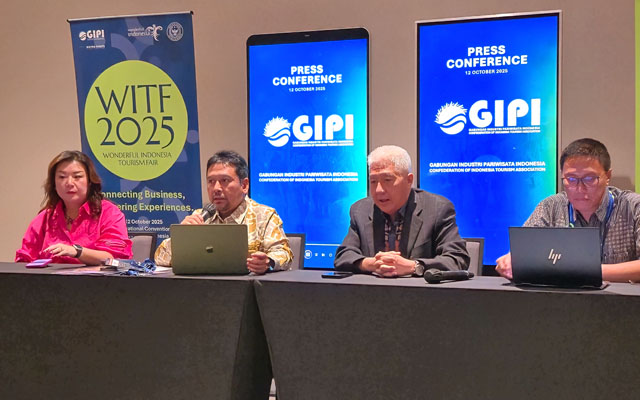The Indonesian House of Representatives passed an amendment to Tourism Law No. 10 of 2009 on October 2, which removes the provision recognising the Indonesian Tourism Industry Association (GIPI). This has drawn criticism from the tourism industry that the move undermines collaboration with the government.
Speaking at a press conference in Jakarta on October 12, Hariyadi Sukamdani, chairman of GIPI, said: “We are extremely disappointed that this removal was done without open discussion, despite GIPI having a proven record of actively contributing to national tourism development.”

Hariyadi stressed that GIPI’s former legal status was vital as the official coordination platform for tourism stakeholders. Its removal will make communication between public and private sectors more difficult.
“This industry drives employment and investment, yet it has been excluded from the legal framework,” he said.
GIPI also highlighted inadequate funding for tourism, noting that government revenue from foreign exchange, taxes, and non-tax state revenue had not been proportionally reinvested in industry development.
“The government cannot simply enjoy the income from tourism without helping the industry to develop its markets,” Hariyadi said.
During the amendment process, GIPI proposed creating a Tourism Public Service Agency (BLU) to collect and manage levies from international tourists transparently for promotion and destination development, a model used in several South-east Asian countries.
However, the BLU concept was later taken over by the government, and the levy is now treated as central government revenue rather than supporting industry programmes.
“This has the potential to cause overlap and make it increasingly difficult for business operators to secure budget support,” Hariyadi said.
GIPI said the law revision, intended to strengthen the sector, has caused disappointment among operators and may hinder achieving this year’s target of 14 million international tourists.
“We hope the government does not view the tourism industry merely as a source of tax and foreign exchange, but as a strategic partner in building the national economy,” Hariyadi said.
As the law has been passed, GIPI plans to write to the president. Hestu Cipto Handoyo, a tourism law expert at Atma Jaya University, Yogyakarta, suggested GIPI submit a judicial review instead.
Responding to GIPI, tourism minister Widiyanti Putri Wardhana said the amendment was an Indonesian House of Representatives initiative discussed with the government and industry through public consultations. She noted tourism associations remain involved under Chapter IV, Article 8, paragraph (2), letter j, which addresses the tourism ecosystem.
“Chapter VII, Article 22 stipulates that every tourism business operator has the right to form and become a member of a tourism association. Based on this, tourism associations can still play a role in building and developing Indonesian tourism,” she said.
Widiyanti added that coordination and partnerships can be regulated flexibly through executive regulations or other mechanisms. On the BLU Pariwisata and the foreign tourist levy, she said it is a government agency providing public services without prioritising profit.
The minister said the government continues to support the sector through internship programmes, competency-based certification and training, destination marketing and promotions, and tax waivers for tourism workers.


















